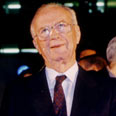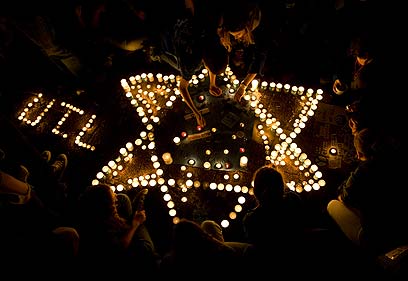
Poll: Don't make Israelis mourn Rabin
Majority of public believes those who feel no pain over former prime minister's murder should not be forced to grieve, Ynet-Yesodot survey shows
The majority of the Jewish public in Israel believes the State's citizens should not be forced to mourn the murder of former Prime Minister Yitzhak Rabin if they do not feel pain over the incident, a survey conducted by Ynet and the Yesodot association ahead of the assassination's 15th anniversary reveals.
The poll also discussed marking the killing only on its Hebrew date and focusing on the value of tolerance in a bid to unit the entire nation around the murder.
The Ynet-Yesodot survey was conducted by the Panels research institute among 304 respondents – a representative national sample of the adult Jewish population in Israel. The maximal sampling error was 5.7%±.
Asked what could help assimilate the Rabin memorial day into the Israeli public, 57% said there was no need to do so, explaining that "if the citizens do not feel any pain they should not be forced to grieve."
Sixteen percent recommended holding night studies in city squares and municipal centers, 14% called for a special prayer to be worded by rabbis and cited during the different ceremonies and in synagogues, and 13% said that recreation centers should be on the memorial day in order to help assimilate the issue among the public.

Rabin memorial rally (Photo: Gil Yohanan)
A segmentation according to the respondents' religiousness shows that most seculars (60%), traditional Jews (55%) and haredim (88%) believe that the memorial day should not be forced on citizens who do not feel pain over the murder. This was the most common response among religious Jews (42%) as well.
In order to unite the people around the Rabin memorial day nonetheless, 44% recommend marking it only according to the Hebrew date – the 12th day of Heshvan, while 10% say it should be united with the anniversary of biblical matriarch Rachel's death, which is marked the day before. Twenty-one percent, on the other hand, have no interest in a memorial day which would unite the people, and the rest (25%) did not respond.
An analysis of the findings shows that haredim (63%) do not seek unity over such events, while secular (48%), traditional (43%) and religious Israelis suggest marking it only on the Hebrew date.
Asked which values would unite the people on the 12th day of Heshvan, 63% chose tolerance, 17% said "respect for the nation's leaders," 12% chose peace, and 8% said "respect for the majority's choice."
The value of tolerance got most votes in all sectors – secular (64%), traditional (62%), religious (64%), and haredi (57%).

Shoshi Becker, Yesodot's educational manager, believes that the survey reflects many people's feeling that the State and the elements involved in the issue have failed in getting all parts of society to share the memory.
The fact that the Rabin memorial day is marked both according to the Hebrew and Gregorian calendar, she said, causes confusion and reflects the rift in Israel between "Judaism" and "universalism." This is expressed in the suggestion backed by most respondents in all sectors – marking the memorial day only on its Hebrew date.
According to Becker, "The survey also reveals that memory and the significance of the grief and of the day are shifting away from the majority of the people, and all streams of Judaism agree that there is no need to 'force' the assimilation of the Rabin murder's memorial day and convince the people that marking this day is important.
"Naturally, the memory and feelings related to historical events – as difficult and traumatic as they may be for the people – tend to dim as time goes by. The survey shows that the value of tolerance should be clarified and developed among the Israeli society from an early age and introduced to every Israeli child.
"Although the value of tolerance is sometimes perceived as clashing with Jewish values, it is important for educators, parents and the media to convey the connection and elements of tolerance expressed in the Jewish holy and literary sources. Without tolerance we won't be able to endure an Israeli society and this is the tool connecting between the State's different groups, streams and opinions."
- Follow Ynetnews on Facebook










